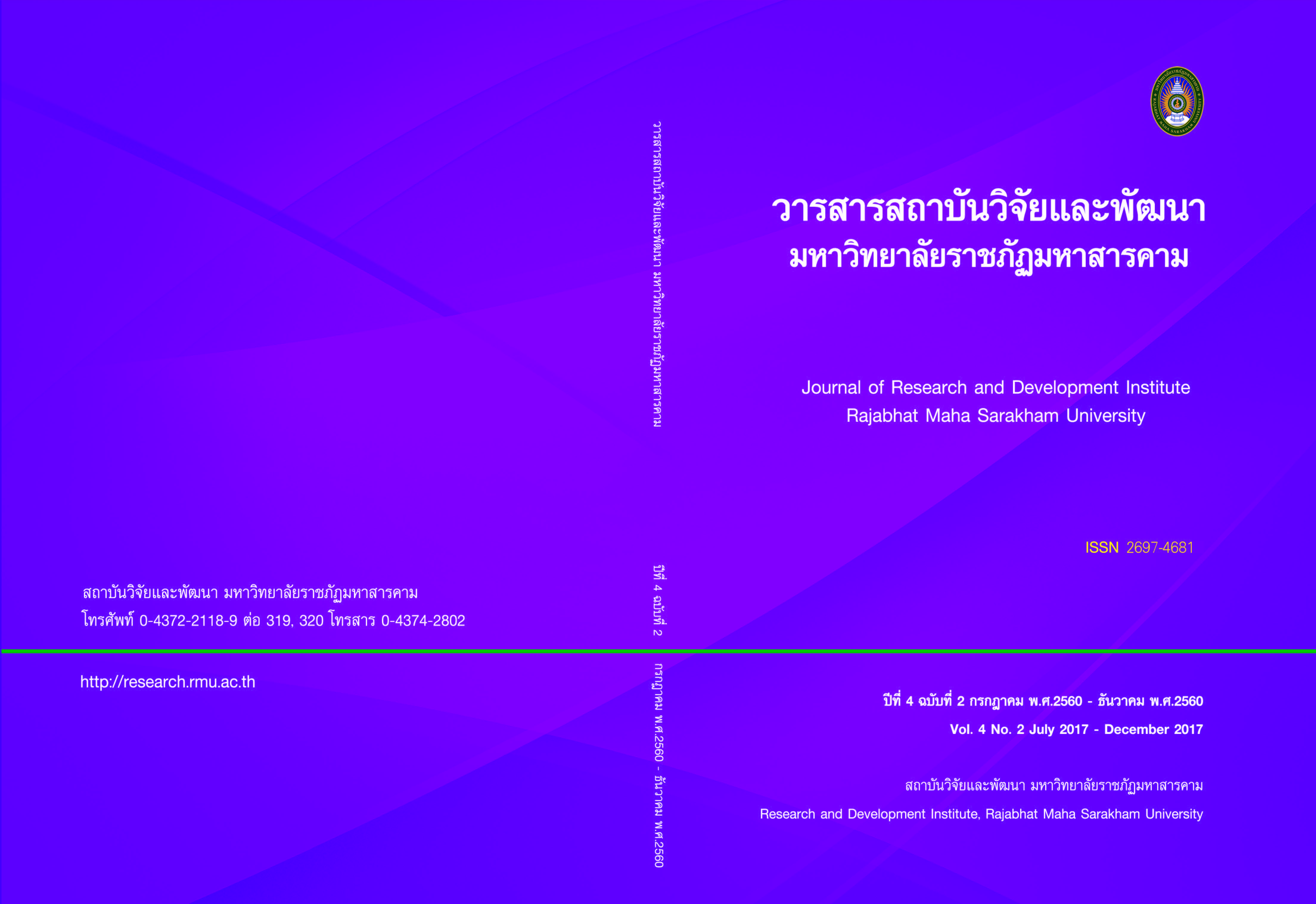Empowerment Evaluation : New Dimension of Project Elevation
Keywords:
Evaluation, Evaluation Empowerment, Project ElevationAbstract
Empowerment evaluation is the assessment that organizations could use as the tool for developing projects in order to get goals and objectives future. There are main issue are; democratic exchange process, situation evaluating of concerned person, collaborative planning and plan implementation continually. Therefore, this article aim to explain the relationship of basic principles of empowerment assessment for Upgrading projects which consists of three principle; to create the core-values, to create the culture of ready and interested in job development, and empowerment assessment is development process.
References
พิกุล ทิตยกุล. (2552). การประเมินโครงการโรงเรียนวิถีพุทธของโรงเรียนราชประชานุเคราะห์ 31 อำเภอแม่แจ่ม จังหวัดเชียงใหม่. วิทยานิพนธ์ศึกษาศาสตรบัณฑิต สาขาการบริหารศึกษา, มหาวิทยาลัยเชียงใหม่.
รัตนะ บัวสนธ์. (2557). การประเมินเสริมพลัง สารานุกรมศึกษาศาสตร์. คณะศึกษาศาสตร์ มหาวิทยาลัยศรีนทรินทรวิโรฒ ฉบับที่ 31.
ราชบัณฑิตยสถาน. (2544). พจนานุกรมฉบับราชบัณฑิตยสถาน พ.ศ. 2544. กรุงเทพมหานคร: บริษัท. ศิริวัฒนาอินเตอร พริ้นท์จํากัด
อมาวสี อัมพันศิริรัตน. (2560). “การประเมินแบบเสริมพลัง: แนวคิดและการประยุกต์ใช้”. วารสารเครือข่ายวิทยาลัยพยาบาลและการสาธารณสุขภาคใต้, 4 (1) : มกราคม - เมษายน 2560
อรทัย อาจอ่ำ. (2550). การประเมินผลเพื่อการสร้างเสริมพลังอำนาจ : ทางออกที่ท้าทาย. พิมพ์ครั้งที่ 2. นครปฐม : โรงพิมพ์สำนักวิจัยประชากร มหาวิทยาลัยมหิดล.
Dwyer, L., Forsyth, P. & Spurr, R. (2006). “Economic evaluation of special events, in Dwyer, L. & Forsyth, P., eds, International Handbook on the Economics of Tourism”, Edward Elgar, Cheltenham, pp 316-355.
Fetterman, D. M. & Wandersman, A. (2005). Empowerment Evaluation : Principle in Practice. New York : Guilfoed.
Fetterman, D. M. (1994a). Empowerment Evaluation : Collaboration, Action Research, and a Case Example. Retrieved March, 3. 2016, [Online] Re5.file : ///D : /Empowerment%20evaluation,Evaluation%20research/Fetterman%201994a.pdf
Fetterman, D. M. (1997). Empowerment Evaluation and Accreditation in Higher Education in Evaluation for the 21st Century : A Handbook. Editors by Chelimsky, E and Shadish, W.R. Sage Publication, Inc : p.381-396.
Fetterman, D. M. (2001). Foundations of Empowerment Evaluation. California : Sage Publication, Inc.
Kenaphoom, Sanya. (2014A). “Research Philosophy : Quantity Quality” Journal of Political Science and Law, Rajabhat Kalasin University, 3 (2), 49-51.
Kenaphoom, Sanya. (2014B). “Establish the Research Conceptual Framework in Public Administration by the Rational Conceptual thinking”. PhetchabunRajabhat Journal, 16 (1) : January-June 2014 : 1-19.
Kenaphoom, Sanya. (2014C). “A Creation of a Research Conceptual Framework for Public Administration by Knowledge Management Methodology” Journal of Humanities and Social Sciences, Ubon Ratchathani University, 5 (2), 13-32.
Kenaphoom, Sanya. (2014D). “The creating of Quantitative Research Conceptual Framework of Public Administration by Literature Review”. Udonthani Rajabhat University Journal of Humanities and Social Science, 3 (1) : January-June 2014.
Kenaphoom, Sanya. (2015). “The research Conceptual Framework Establishment by the Grounded Theory” VRU Research and Development Journal,10 (3) (September-December. 2015)
Kenaphoom, Sanya. 2017. “Establishment of a Survey Research Conceptual Framework on Management” ASEAN Journal of Management and Innovation (ISSN 2351-0307), 4 (1) ; January-June
2017.
Zimmerman, M. A. (2000). Empowerment theory: Psychological, organizational and community levels of analysis. In J. Rappaport & E. Seidman (Eds.), Handbook of community psychology (pp. 43–63). New York : Kluwer Academic/Plenum
Downloads
Published
How to Cite
Issue
Section
License
Articles that are published are copyrighted by the authors of the articles







